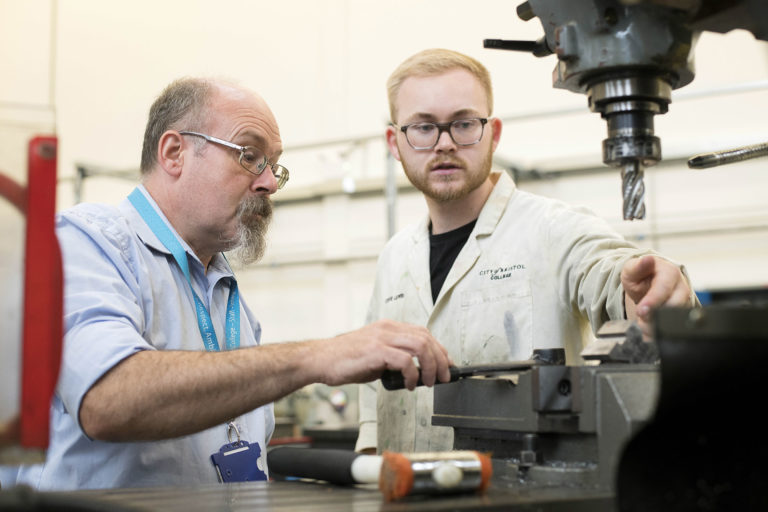Course overview
Engineering and Manufacturing T Level City of Bristol CollegeThis course is comprised of topics such as:
- Design and Development for Engineering
- Manufacturing Maintenance
- Installation and Repair for Engineering
- Manufacturing Engineering
- Manufacturing
- Processing and Control
Dates and applications
Please hover over the ‘i’ button to find out more about course fees and applications.
| Course Code | Dates | Duration | Days | Hours per week | Start Time | Location | Fee | |
|---|---|---|---|---|---|---|---|---|
| LPF1423D01-1 | 02/09/2024 - 26/06/2026 | 2 years | Date/Day(s) Being Finalised | 18.00 | 09:15 | Advanced Engineering Centre (AEC) |
This course is still in its planning phase; course details - including fee information - are subject to change. In June, course details will be finalised and enrolment will open.
|
Enquire Apply |
Additional information
Who is this course for?
The T Level in Engineering and Manufacturing will provide learners with the knowledge, skills and behaviours needed to progress into skilled employment, higher-level technical training or university-level study in the Engineering Sector.
It will cover Design and Development for Engineering and Manufacturing Maintenance, Installation and Repair for Engineering and Manufacturing Engineering, Manufacturing, Processing and Control.
This is a 2-year programme where you cover common core elements in the first year and choose your occupation specialism in the second year.
What you'll learn
Students will develop an understanding of a broad range of issues relevant to the sector, including:
- Working within the engineering and manufacturing sectors – an understanding of how materials, conditions and context influence design processes and products
- Essential mathematics for engineering and manufacturing – a knowledge and understanding of mathematics, including standard matrices and determinants
- Standard trigonometry materials and their properties – understanding material processing techniques and their effects on materials and material quality, the condition of materials, how these are managed
- Materials testing methods and techniques business
Commercial and financial awareness – basic commercial principles, including commercial priorities and markets, customers/clients/partners and resource allocation
Depending on the T Level route, the following options are available to specialise in:
- Design and Development for Engineering and Manufacturing
- Fitting and assembly technologies
- Machining and toolmaking technologies
- Composites manufacturing technologies
- Fabrication and welding technologies
- Maintenance
- Installation and Repair for Engineering and Manufacturing maintenance engineering technologies
- Mechanical maintenance engineering technologies
- Mechatronic maintenance engineering technologies
- Electrical & electronic maintenance engineering technologies
- Control & instrumentation maintenance
- Installation and repair
- Light and electric vehicles Engineering, Manufacturing, Processing and Control fitting
- Assembly technologies, machining and toolmaking technologies
- Composites manufacturing
- Technologies fabrication
- Welding technologies
Course entry requirements
5 GCSEs at Grade 5 or above, including English Language and Maths.
We will invite you to a course information meeting event where you will receive information, advice, and guidance about the course you have applied for. This will be an opportunity for you to gain valuable information about the course and give you the opportunity to ask any questions you may have.
You will also be informed about the requirements of the Industry placements, the model of this being delivered (dependant on T-Level Pathway) and the commitment this will require as a T-Level cannot be fully achieved if the placement hours are not fulfilled.
You will need to provide a copy of your last school report and/or a reference from an employer or relevant professional; this will include attendance. This is to ensure we can support you to be able to achieve well on the course.
Applicants with 85% or below attendance will have been deemed not to have met this criterion. All applicants are given an opportunity to discuss any evidence-based mitigating circumstances that may have affected the reference/school report. We are firmly committed to finding the right course for you to ensure you can flourish.
Talk to us today if you have any concerns about the application process; we are here to help take you to the next level.
Progressing students Level 2 Ex Cert qualification (merit level or above) in a relevant subject plus GSCE English and maths C/4
How is the course delivered and assessed?
The T Level is delivered through classroom-based and practical learning at college and on industry placement.
The technical qualification is the main classroom-based element of the course and consists of the core component and occupational specialism component.
There will be internal assessments, exams and employer-set projects that are done through a mixture of classroom, workshop and work-based learning.
Future career and study opportunities
T Levels are equivalent to 3 A Levels and upon successful completion of the T Level in Engineering and Manufacturing, students can progress to study advanced engineering and manufacturing with higher education and qualifications, higher level apprenticeships and even into direct employment.
Additional costs
As a City of Bristol College student, you may incur additional costs to attend your course. For example, you may likely need to pay for travel and stationery.
Many courses offer learning opportunities that you may need to pay for. This may include things like study visits and visiting speakers. We will let you know in advance if there will be additional costs.
If you are on a limited income, you may be able to receive help from our Learner Support Funding Bursary.
-
Career Coach
For guidance on which career path to take, to explore career options related to our courses, find out which careers are in demand, and then get the training you need.















